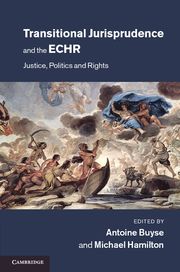Transitional Jurisprudence and the ECHR: Justice, Politics and Rights

Transitional Jurisprudence and the ECHR: Justice, Politics and Rights
Antoine Buyse and Michael Hamilton, eds.
Cambridge University Press 2011
The European Convention on Human Rights has been a standard-setting text for transitions to peace and democracy in states throughout Europe. This book analyses the content, role and effects of the jurisprudence of the European Court relating to societies in transition. It features a wide range of transitional challenges, from killings by security forces in Northern Ireland to property restitution in East Central Europe, and from political upheaval in the Balkans to the position of religious minorities and Roma. Has the European Court developed a specific transitional jurisprudence? How do politics affect the ways in which the Court’s judgments are implemented? Does the Court’s case-law itself become woven into narratives of struggle in transitional societies? This book seeks to answer these questions by highlighting the unique role of Europe’s main guardian of human rights, the Court in Strasbourg. It includes a comparison with the Inter-American and African human rights systems.
Features
• Unique overview of the Court’s case-law relating to transitions provides a full analysis of the Court’s transitional jurisprudence in a single volume
• Goes beyond a purely legal approach, placing the Strasbourg Court’s work in a wider political context to explain both the contents and the impact of the Court’s transitional case-law
• Includes a comparison with the African and Inter-American human rights systems, enabling an understanding of both the unique features of the ECHR on this topic as well as experiences gained in other regions of the world